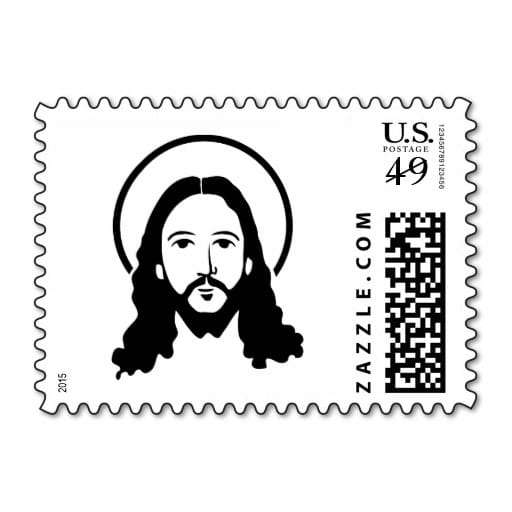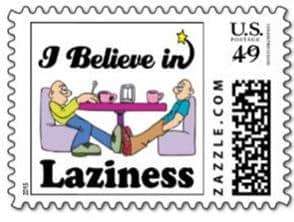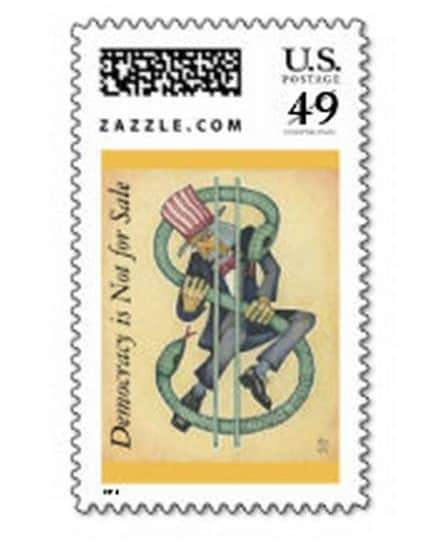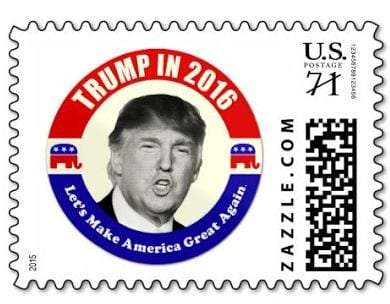The Volokh Conspiracy
Mostly law professors | Sometimes contrarian | Often libertarian | Always independent
Does the government 'speak' through its postage stamps?
Last week I noted something that looked to me like a pretty clear First Amendment violation in the-making: state officials in Minnesota vowing to revoke one of their citizens' license plates (which read "FMUSLMS") because it found the message conveyed objectionable, and to reform their procedures for issuing "specialty license plates" to "ensure it does not occur again."
It turns out that a complaint raising this very issue was filed a couple of months ago in the D.C. federal District Court (Zukerman v. US Postal Service, 15-cv-02131-CRC), and it's a really interesting case.
Here are the basic facts, taken from the complaint. The Postal Service allows anyone to design his or her own postage stamps, valid for use on U.S. mail.
(I don't know about you, but I didn't know about this. "Upload your own images to create unique postage in a variety of sizes and denominations." The details are here.)
The USPS contracts with several private vendors, who are authorized to create customized postage stamps. So you can create valid USPS stamps that look like this (and, just for the record - and for the editors at washingtonpost.com - these images come from Zukerman's complaint, and reproducing them here unquestionably constitutes "fair use"):

Or this:

Or this:

The whole thing is kind of cool, actually - and it might even make the USPS a little bit of money. I'm thinking of printing up a roll or two myself (perhaps with a picture of my new granddaughter Dorothy).
But the vendor (Zazzle.com), to which Anatol Zukerman submitted his design - Uncle Sam with a snake, labeled "Citizens United," coiled around him in the shape of a dollar sign, and the words "Democracy is Not for Sale" along the side - rejected it.

Zazzle said it was "unable to process the order" because the order was "in conflict with our content guidelines," which include a prohibition on "the printing of any postage with content that is primarily partisan or political in nature."
Zukerman asserts that Zazzle's action violates the First Amendment - a form of government-imposed content-based discrimination.
As I noted in my earlier post, the law here is (as it is in much of First Amendment law) a bit of a mess - albeit a really interesting one. The basic framework was set out by the Supreme Court last year in the case of Walker v. Texas Division, Sons of Confederate Veterans.
In Walker, Texas refused to produce a line of "specialty license plates" featuring the Confederate battle flag (and the Sons of Confederate Veterans (SCV) logo), and the Supreme Court held (5 to 4) that its refusal did not offend the First Amendment.
All nine justices agreed on the basic structure of the inquiry. There's a threshold question: Are the messages on the specialty plates "government speech," or are they "private speech"? The distinction is critical, because if it is the former, the government is free to choose which messages it wishes to convey, and which messages it wishes to avoid:
When government speaks, it is not barred by the Free Speech Clause from determining the content of what it says. . . . Government statements (and government actions and programs that take the form of speech) do not normally trigger the First Amendment rules designed to protect the marketplace of ideas. . . .
If, on the other hand, this is "private speech," the government is (ordinarily) not permitted to make content- or viewpoint-based discriminations, favoring some messages and disfavoring others (at least, not without a damn good reason for doing so).
The majority - rather oddly, in my view - held that the specialty plates were conveying "government speech," and the discrimination against the SCV's message was therefore permissible. Why?
First, the history of license plates shows that, insofar as license plates have conveyed more than state names and vehicle identification numbers, they long have communicated messages from the States. . . .
Second, Texas license plate designs are often closely identified in the public mind with the [State]. Texas license plates are, essentially, government IDs. And issuers of ID typically do not permit the placement on their IDs of messages with which they do not wish to be associated. . . .
Third, Texas maintains direct control over the messages conveyed on its specialty plates. Texas law provides that the State 'has sole control over the design, typeface, color, and alphanumeric pattern for all license plates.' This final approval authority allows Texas to choose how to present itself and its constituency. … Texas, through its Board, selects each design featured on the State's specialty license plates. Texas presents these designs on government-mandated, government-controlled, and government-issued IDs that have traditionally been used as a medium for government speech. And it places the designs directly below the large letters identifying "TEXAS" as the issuer of the IDs. The [designs] that are accepted, therefore, are meant to convey and have the effect of conveying a government message, and they thus constitute government speech.
And because it is "government speech," Texas may
offer plates celebrating the many educational institutions attended by its citizens. But it need not issue plates deriding schooling. Texas offers plates that pay tribute to the Texas citrus industry. But it need not issue plates praising Florida's oranges as far better. And Texas offers plates that say "Fight Terrorism." But it need not issue plates promoting al Qaeda . . .
Personally, I find Justice Samuel Alito's dissent (joined by Justices John Roberts, Antonin Scalia and Anthony Kennedy) pretty persuasive; this looks a lot more like private speech to me, and the government has an obligation to be neutral between competing expressions:
The Court holds that all the privately created messages on the many specialty plates issued by the State of Texas convey a government message rather than the message of the motorist displaying the plate. Can this possibly be correct?
Here is a test. Suppose you sat by the side of a Texas highway and studied the license plates on the vehicles passing by. You would see, in addition to the standard Texas plates, an impressive array of specialty plates. (There are now more than 350 varieties.) You would likely observe plates that honor numerous colleges and universities. You might see plates bearing the name of a high school, a fraternity or sorority, the Masons, the Knights of Columbus, the Daughters of the American Revolution, a realty company, a favorite soft drink, a favorite burger restaurant, and a favorite NASCAR driver. As you sat there watching these plates speed by, would you really think that the sentiments reflected in these specialty plates are the views of the State of Texas and not those of the owners of the cars? If a car with a plate that says "Rather Be Golfing" passed by at 8:30 am on a Monday morning, would you think: "This is the official policy of the State-better to golf than to work?" If you did your viewing at the start of the college football season and you saw Texas plates with the names of the University of Texas's out-of-state competitors in upcoming games- Notre Dame, Oklahoma State, the University of Oklahoma, Kansas State, Iowa State-would you assume that the State of Texas was officially (and perhaps treasonously) rooting for the Longhorns' opponents? And when a car zipped by with a plate that reads "NASCAR - 24 Jeff Gordon," would you think that Gordon (born in California, raised in Indiana, resides in North Carolina) is the official favorite of the State government? The Court says that all of these messages are government speech. . . .
The court's decision thus "passes off private speech as government speech and, in doing so, establishes a precedent that threatens private speech that government finds displeasing [by stripping it] of all First Amendment protection."
So back to those postage stamps - government speech or private speech?
I suppose one can argue it both ways under Walker. The three factors identified in Walker - the history of postage stamps, whether postage stamps are "closely identified in the public mind" with the government, and whether the government has "direct control over the messages conveyed" - point in different directions. Certainly the history of postage stamps would lead one to conclude that postage stamps convey a government-approved message, because up until a few years ago, they always had done so. On the other hand, the production of these stamps is very definitely not under government control, and there's nothing like Texas's elaborate approval process involved here; the vendor websites make it abundantly clear that the USPS does not review, endorse or approve anything that users may wish to print.
And as to whether postage stamps are "closely identified in the public mind" with the government, that question has a kind of odd circularity to it. I would think that the answer might well be yes - unless "the public mind" is aware of the very program whose operation is being challenged. As I said, I didn't know about this program before, and, as a result, if I had received a letter in the mail with a stamp that looked like this:

I would have thought that some sort of coup had taken place. But now that I know about this private printing program, I would understand that the stamp was just some knucklehead's idea of political activism, and that the government had nothing to do with the message conveyed.
And not only is the public dissemination of the existence of the program relevant to the determination of whether it's "government speech," the lawsuit itself can affect that determination, because it can affect how "the public mind" reacts to these things. Now that you've read this blog post, your little piece of the public mind understands that postage stamps convey private messages. If this post - or other discussion of this very case - were to go viral, postage stamps would no longer be identified in the public mind with government speech.
So the filing of the lawsuit can have a direct effect on the analysis of the claim and the outcome of the suit; there's something a little peculiar about that.
Show Comments (0)